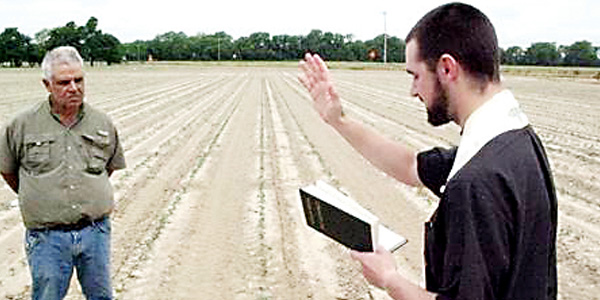By Father Scott Thomas
May 24 marked the one-year anniversary of Pope Francis’ landmark encyclical Laudato Si, in which he spoke to humanity about its relationship with creation. In rural Mississippi, especially in the Delta, people still depend on the yield of the land. So many jobs are based on farming, so naturally the Holy Father’s encyclical is very relevant to our diocese and state. Towards the end, the Holy Father says, “The rich heritage of Christian spirituality, the fruit of twenty centuries of personal and communal experience, has a precious contribution to make to the renewal of humanity.” One of those contributions is the celebration of Rogation Days in the month of May.

Father Thomas blesses St. Elizabeth parishioner, Mark Agostinelli’s field in Clarksdale. In rural Mississippi, especially in the Delta, people still depend on the yield of the land.
Rogation Days within the Christian church can be traced back to the days of St. Mamertius (d. 475). His diocese suffered different natural disasters so he recommended the faithful to turn to fasting in asking for divine assistance and protection over the course of the three days before the Ascension. This continues today, but unfortunately with less participation since the reform of the Roman Calendar following the Second Vatican Council.
During that reform, Pope Bl. Paul VI asked that during Rogation Days prayers for vocations to the priesthood be added. After all, the flock of Christ is seen as a harvest in Sacred Scripture (Luke 10:2), and many laborers are needed to work this harvest. Paul VI’s interest in these days shows that he himself intended for Rogation Days to still be celebrated in some fashion because he saw the value in them.
The church teaches us through her social doctrine that our work can be a participation in the creation of the world. Pope Francis recently said that Jesus “sanctified human labor and endowed it with a special significance for our development.” Thus, as St. John Paul II stated, through our work humanity “in a way collaborates with the Son of God for the redemption of humanity.” God blesses our work in a number of ways, most visibly through the church and her priests as farmers take their pastor into the fields during the Rogation Days.
St. Elizabeth parishioner, Richard Noe, has farmed in the Clarksdale area for 55 years. These days he farms with his son Richard and is joined by his grandson Zachary during the summers. According to Noe, during the days of Msgr. McKenna, one or two retired farmers would pick up the priest and take him around to all of the farms in the parish boundaries. But today each individual farmer meets the priest or picks him up and escorts him to a patch of fledgling crops. This way more are involved and the pastor greets his flock on their turf, in their “natural habitats” away from the parish rectory.
Jude Watts, also a parishioner of St Elizabeth who farms with his son Thad, says that the farmer learns very quickly to trust in God’s providence. “Farming is good proof that God is in control. We can’t control the rain so of course God’s blessing on our crops is needed,” said Watts. There is a lot that farmers have to contend with, whether it be a lack of rain, high winds blowing sand on the crops, a scorching sun, or pests such as wild hogs.
While we can till the ground more efficiently, improve seeds, and have access to beneficial chemicals, even as technology grows, we are still dependent upon God and His grace for us. Rogation days are a marvelous reminder of this as we fast and pray for God’s blessing on our farms and gardens. Of course, we in no way should limit these prayers to just three or four days. Rather, we should always pray to God for favorable weather and a good harvest for the benefit of the farmers, their community and beyond.
(Father Scott Thomas is the pastor of Clarksdale St. Elizabeth Parish)
